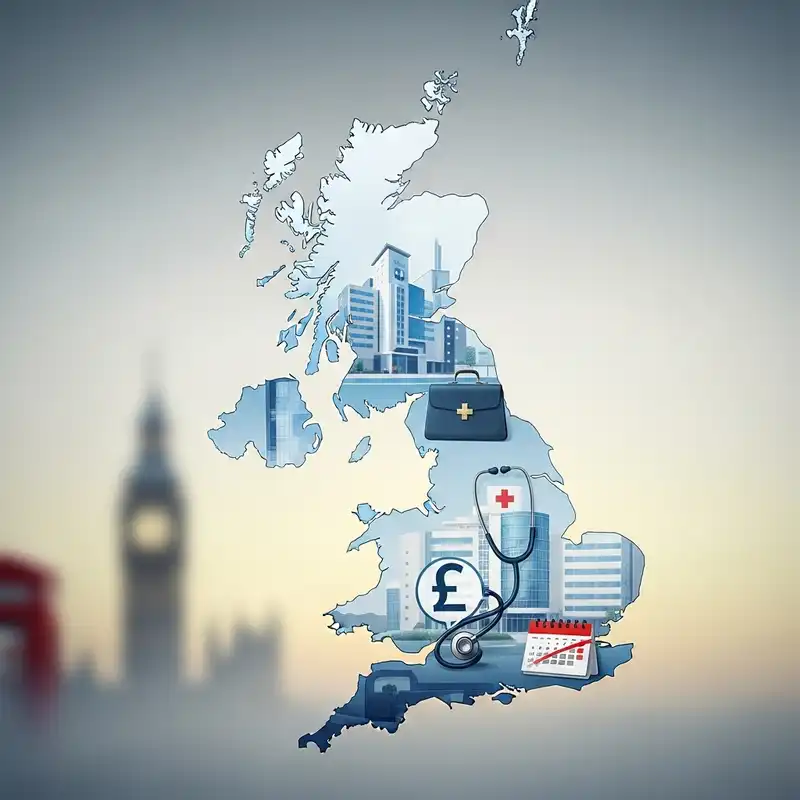TL;DR
We are a generation obsessed with wellness. We track our steps, optimise our sleep, and fill our fridges with organic produce. We invest in gym memberships, mindfulness apps, and a positive mindset, all in pursuit of a healthier, more fulfilling life.
Key takeaways
- Income Loss: For many, this is the most immediate blow. Statutory Sick Pay (SSP) in the UK stands at a meagre £116.75 per week (for 2024/25) for up to 28 weeks, for those who are eligible. For the millions of self-employed workers, there is no SSP at all. Could your household survive on that?
- Increased Expenses: A serious illness brings a raft of new costs. These can include travel to and from hospital appointments, parking fees, prescription charges, private consultations or treatments, and modifications to your home or vehicle.
- The Impact on Loved Ones: Often, a spouse or partner may need to reduce their working hours or stop working altogether to provide care, further straining the household budget. The emotional toll is immense, and financial pressure only exacerbates it.
- Clear your mortgage: Removing your biggest monthly outgoing can alleviate huge financial and mental pressure.
- Cover medical costs: Pay for specialist treatments, consultations, or drugs not available on the NHS.
Beyond Mindset the Future Proof You
We are a generation obsessed with wellness. We track our steps, optimise our sleep, and fill our fridges with organic produce. We invest in gym memberships, mindfulness apps, and a positive mindset, all in pursuit of a healthier, more fulfilling life. Yet, amidst this flurry of self-improvement, a colossal blind spot remains.
It’s the conversation we’re not having. The one about the stark financial reality of what happens when our health, despite our best efforts, takes an unexpected turn.
The statistics are sobering. Projections from Cancer Research UK indicate that one in two people born in the UK after 1960 will be diagnosed with some form of cancer in their lifetime. Let that sink in. This isn't a remote possibility; it's a mainstream probability. And cancer is just one of many serious health conditions—like heart attacks, strokes, or debilitating back injuries—that can strike without warning.
When a health crisis hits, it doesn't just attack the body; it launches an all-out assault on your financial stability. The stress of a diagnosis is compounded by the anxiety of dwindling savings, mounting bills, and the fear of losing your home. This is the great wellness blind spot: the failure to recognise that true, lasting wellbeing is impossible without a foundation of financial resilience.
This guide is about moving beyond mindset alone. It's about future-proofing your life by building a financial fortress. We will explore the critical, yet often overlooked, insurance solutions that act as your personal safety net. From Income Protection and Critical Illness Cover to specialist plans for tradespeople and company directors, we will show you how strategic financial planning is the ultimate act of self-care—the key to unlocking your potential and living a life unburdened by the fear of the unforeseen.
The Wellness Paradox: Healthy Habits, Fragile Finances
In 2025, the UK wellness industry is a multi-billion-pound behemoth. We spend, on average, hundreds of pounds each year on activities and products designed to enhance our physical and mental health. Yet, a significant portion of the population remains perilously exposed to financial shock.
Consider this paradox: a person might spend £50 a month on a premium gym membership to strengthen their body but have no provision for their income if that body becomes too ill to work. They might buy the highest-welfare organic food but have no plan for how to afford it if their paycheque stops. (illustrative estimate)
This isn't a failure of intention; it's a failure of perspective. The prevailing wellness narrative champions personal control—diet, exercise, mindfulness. But it often ignores the external factors we cannot control, such as a sudden illness or accident.
The True Cost of Sickness
When a serious illness strikes, the financial consequences can be swift and devastating. It's a domino effect that goes far beyond the loss of your monthly salary.
- Income Loss: For many, this is the most immediate blow. Statutory Sick Pay (SSP) in the UK stands at a meagre £116.75 per week (for 2024/25) for up to 28 weeks, for those who are eligible. For the millions of self-employed workers, there is no SSP at all. Could your household survive on that?
- Increased Expenses: A serious illness brings a raft of new costs. These can include travel to and from hospital appointments, parking fees, prescription charges, private consultations or treatments, and modifications to your home or vehicle.
- The Impact on Loved Ones: Often, a spouse or partner may need to reduce their working hours or stop working altogether to provide care, further straining the household budget. The emotional toll is immense, and financial pressure only exacerbates it.
A 2023 study by Macmillan Cancer Support found that four in five people with cancer in the UK experience a financial impact, which for those affected is on average £891 a month. This "cost of cancer" is a stark illustration of how a health crisis becomes a financial crisis. True wellness isn't just about preventing illness; it's about preparing for it. (illustrative estimate)
Your Financial Fortress: The Core Pillars of Protection
Building financial resilience doesn't require a Wall Street salary or a portfolio of complex investments. It begins with creating a robust safety net using a few core financial protection products. Think of these not as expenses, but as investments in your peace of mind and your family's future.
Let's break down the essential pillars.
Pillar 1: Income Protection Insurance – Your Monthly Salary, Secured
If your ability to earn an income is your most valuable asset, Income Protection is the insurance that protects it. It’s arguably the bedrock of all financial planning.
What is it? Income Protection (IP) is a long-term insurance policy that pays out a regular, tax-free monthly income if you are unable to work due to illness or injury.
How does it work?
- Benefit Amount: You can typically cover 50-70% of your gross monthly income. The payments are tax-free, so this often equates to a similar take-home pay.
- Deferred Period: This is the waiting period between when you stop working and when the policy starts paying out. It can be anything from 4 weeks to 12 months. The longer the deferred period you choose, the lower your monthly premiums will be. You can align it with your employer's sick pay scheme or your emergency savings.
- Payment Term: The policy can pay out for a set period (e.g., 2 or 5 years) or right up until you are able to return to work, retire, or the policy term ends, whichever comes first.
For most people, a long-term policy that pays out until retirement age offers the most comprehensive protection. It covers you for everything from a serious back injury that keeps you off work for a year to a chronic condition that prevents you from ever returning to your original job.
Income Protection vs. Statutory Sick Pay (SSP)
| Feature | Statutory Sick Pay (SSP) | Income Protection Insurance |
|---|---|---|
| Provider | Your Employer (mandated by Government) | Private Insurance Company |
| Max Payment | £116.75 per week (2024/25 rate) | 50-70% of your gross salary (tax-free) |
| Duration | Up to 28 weeks | Potentially until your retirement age |
| Eligibility | Employees earning over a certain threshold | Anyone with an income; subject to underwriting |
| Coverage | Basic, often insufficient for living costs | Tailored to cover your actual lifestyle costs |
Pillar 2: Critical Illness Cover – A Lump Sum for Financial Breathing Space
While Income Protection replaces your salary, Critical Illness Cover is designed to provide a one-off, tax-free lump sum if you are diagnosed with a specific serious condition defined in the policy.
What is it for? The lump sum provides immediate financial relief and options. It gives you the freedom to make choices that aren't dictated by financial pressure.
How could you use the payout?
- Clear your mortgage: Removing your biggest monthly outgoing can alleviate huge financial and mental pressure.
- Cover medical costs: Pay for specialist treatments, consultations, or drugs not available on the NHS.
- Adapt your home: Install a stairlift, a wet room, or other necessary modifications.
- Take time off: Allow your partner to take an unpaid sabbatical to support you.
- Fund a change in lifestyle: Reduce your working hours or simply take a recuperative holiday with your family.
The list of conditions covered is extensive, but typically includes major illnesses like most types of cancer, heart attack, stroke, multiple sclerosis, and kidney failure. It’s vital to check the policy definitions, as they can vary between insurers. An expert adviser can help you understand the nuances.
Pillar 3: Life Insurance – The Ultimate Legacy of Care
Life Insurance is perhaps the most well-known form of protection. Its purpose is simple but profound: to provide a financial payout to your loved ones if you pass away during the policy term.
There are several types, but two main forms cater to most needs:
- Term Life Insurance: This is the most common and affordable type. It covers you for a fixed period (the "term"), such as 25 years, often set to run alongside a mortgage or until your children are financially independent. If you die within the term, it pays out. If you survive the term, the policy ends and has no value.
- Family Income Benefit: This is a variation of term insurance. Instead of a single lump sum, it pays out a regular, tax-free monthly or annual income to your family from the time of the claim until the policy's end date. This can be easier for a grieving family to manage than a large lump sum and is excellent for replacing a lost salary to cover ongoing bills.
Who needs Life Insurance?
- Anyone with a mortgage.
- Parents with dependent children.
- Anyone with a partner who relies on their income.
- Business owners with financial partners.
It’s a selfless purchase that ensures the people you care about most are not left with a financial burden at the most difficult of times.
Pillar 4: Private Medical Insurance (PMI) – Access, Choice, and Speed
While the NHS is a national treasure, it is under undeniable strain. Waiting lists for consultations and non-urgent procedures can be long, causing prolonged pain, anxiety, and time off work. Private Medical Insurance (PMI) is a health insurance policy that covers the cost of private medical care.
Key Benefits of PMI:
- Speed: Bypass long NHS waiting lists for specialist consultations, diagnostic scans (like MRI and CT), and surgery.
- Choice: Choose your specialist, consultant, and the hospital where you receive treatment.
- Comfort: Access to private hospitals often means a private en-suite room, more flexible visiting hours, and other home comforts.
- Access to Treatment: Gain access to certain drugs or treatments that may not be routinely available on the NHS due to funding constraints.
PMI is not a replacement for the NHS. Emergency services (A&E) and the management of chronic long-term conditions will still typically be handled by the NHS. PMI is designed to work alongside it, giving you a fast-track option for eligible, acute conditions.
Specialist Solutions for the Backbone of the UK Economy
While the core pillars of protection are relevant to everyone, certain professions and business structures have unique vulnerabilities that require tailored solutions.
For the Self-Employed and Tradespeople: Your Own Safety Net
The 4.2 million self-employed people in the UK are the lifeblood of the economy. From freelance creatives to skilled tradespeople like electricians, plumbers, and builders, they embody independence and drive. However, this independence comes with significant financial risk.
- No employer sick pay.
- No eligibility for Statutory Sick Pay.
- No work means no pay, instantly.
For this vital group, standard Income Protection is essential. However, for those in manual or higher-risk trades, a specific type of cover known as Personal Sick Pay insurance can be a perfect fit. These policies are often more straightforward, designed for short-to-medium term cover (typically 1 or 2 years per claim) and have simpler underwriting, making them ideal for covering periods of incapacity due to the accidents and injuries more common in manual work.
A Tale of Two Electricians
| Scenario | Alex (Without Protection) | Ben (With Personal Sick Pay) |
|---|---|---|
| The Incident | Falls from a ladder, breaks his leg. Doctor signs him off work for 3 months. | Falls from a ladder, breaks his leg. Doctor signs him off work for 3 months. |
| Immediate Income | £0. Has to apply for Universal Credit, which is a slow and complex process. | After a 1-week deferred period, his policy starts paying him £2,000 a month, tax-free. |
| Financial Impact | Drains his emergency savings in the first month. Starts missing bill payments. Huge stress. | His bills are paid. His mortgage is secure. He can focus entirely on his recovery. |
| The Outcome | Returns to work under financial pressure, still not fully recovered, risking further injury. | Returns to work fully healed and without the burden of debt and anxiety. |
For Company Directors and Business Owners: Protecting Your Business and Yourself
If you run your own limited company, you have access to highly tax-efficient ways to arrange protection, benefiting both you and your business.
1. Key Person Insurance Is there one person in your business whose death or serious illness would cause a significant financial loss? This could be a top salesperson, a technical genius, or you, the founder. Key Person Insurance is a life and/or critical illness policy taken out by the business on that key individual.
- How it works: The business pays the premiums and is the beneficiary. If the key person dies or becomes critically ill, the policy pays a lump sum to the business.
- What it's for: This cash injection can be used to recruit a replacement, cover lost profits, or reassure lenders and investors. It provides stability during a period of crisis.
2. Executive Income Protection This is Income Protection, but owned and paid for by your limited company on behalf of a director or employee.
- Key Advantage: Tax Efficiency. The premiums are typically considered an allowable business expense, meaning they can be offset against the company's corporation tax bill. This makes it a far more cost-effective way to secure your income compared to a personal policy paid from your post-tax salary.
3. Relevant Life Cover This is a standalone death-in-service policy for an individual employee or director, paid for by the business.
- Key Advantage: Tax Efficiency. Like Executive IP, the premiums are usually an allowable business expense. Crucially, it is not treated as a P11D benefit-in-kind, so there is no extra income tax for the employee. The payout is made into a discretionary trust, so it typically avoids inheritance tax. It’s an excellent way for small businesses to offer a valuable life insurance benefit without the complexity of a full group scheme.
Navigating these options requires expertise. At WeCovr, we specialise in helping company directors and business owners implement the most tax-efficient and effective protection strategies, comparing plans from across the market to protect not just their families, but their business legacy too.
The Holistic Approach: Where Wellness and Wealth Converge
Building your financial fortress is the ultimate act of preventative wellness. The knowledge that you and your family are protected from financial catastrophe has a profound, tangible impact on your mental health today.
- Reduced Anxiety: It removes the persistent, low-level "what if?" anxiety that hums in the background of modern life.
- Empowerment: It puts you in control, allowing you to focus your energy on growth, creativity, and living life to the full, rather than on fear and scarcity.
- Better Relationships: It removes a major potential source of stress and conflict from your relationships, allowing for more open conversations about the future.
This financial security provides the platform upon which all your other wellness efforts can thrive. It is far easier to eat well, exercise regularly, and practice mindfulness when you aren't worried about losing the roof over your head.
This holistic view of wellbeing is at the heart of our philosophy. We believe in supporting our clients' health in every sense. That's why, in addition to arranging robust financial protection, we provide our clients with complimentary access to CalorieHero, our exclusive AI-powered nutrition and calorie tracking app. It's our way of helping you invest in your physical health today, while we ensure your financial health is secure for tomorrow.
Beyond the Core: Completing Your Plan
For those looking to create a truly comprehensive plan, a few other elements are worth considering:
- Emergency Fund: Aim to have 3-6 months' worth of essential living expenses saved in an easy-access account. This is your first line of defence for short-term issues.
- Estate Planning: A valid will is non-negotiable. It ensures your assets are distributed according to your wishes.
- Gift Inter Vivos Insurance: If you have made a large financial gift to a loved one (e.g., a deposit for a house), it may be subject to Inheritance Tax if you die within seven years. This specialist life insurance policy is designed to pay out a lump sum to cover that potential tax bill, ensuring your gift is received in full.
Taking the First Step: Your Path to Financial Resilience
We have covered a lot of ground, and the world of protection insurance can seem complex. But the journey to financial resilience starts with a single, simple step: a conversation.
Here's how to get started:
- Assess Your Situation: Think about your dependents, your income, your major outgoings (like your mortgage), and what sick pay your employer provides, if any. What would happen if your income stopped tomorrow?
- Don't Go It Alone: The DIY approach can be fraught with risk. Policy wordings are complex, and choosing the wrong product or level of cover can be a costly mistake.
- Seek Expert Advice: This is where a specialist independent broker adds immense value. An expert adviser will take the time to understand your personal circumstances, family needs, and budget. They can then search the entire market, including all the UK's major insurers, to find the right policies for you.
At WeCovr, we provide this expert, no-obligation advice. We demystify the jargon, compare the small print, and handle the application process, ensuring you get the most comprehensive cover for the most competitive price. We believe everyone deserves the peace of mind that comes from knowing they are prepared for whatever life may bring.
The future is uncertain. But your ability to withstand its challenges doesn't have to be. By addressing the great wellness blind spot and building your financial fortress, you are not just buying an insurance policy. You are investing in a future where you are free to pursue your potential, unburdened and unafraid. You are creating the future-proof you.
What is the difference between Income Protection and Critical Illness Cover?
Do I need protection insurance if I'm young and healthy?
Is the payout from these insurance policies taxed?
How much cover do I actually need?
Do I have to take a medical exam to get insurance?
Sources
- Office for National Statistics (ONS): Mortality and population data.
- Association of British Insurers (ABI): Life and protection market publications.
- MoneyHelper (MaPS): Consumer guidance on life insurance.
- NHS: Health information and screening guidance.

































